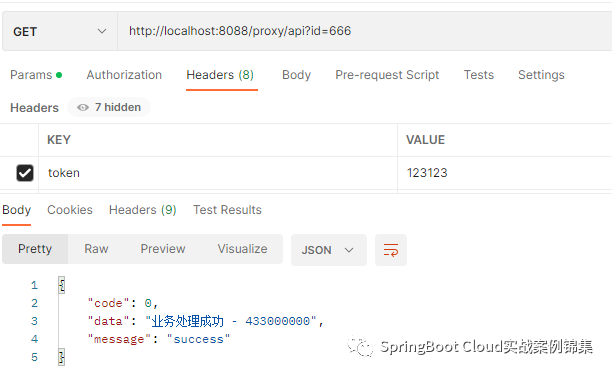环境:SpringBoot2.5.13
Spring Cloud Gateway提供了一个名为ProxyExchange的实用程序对象。你可以在常规Spring web处理程序中使用它作为方法参数。它通过镜像HTTP动词的方法支持基本的下游HTTP交换。在MVC中,它还支持通过forward()方法转发到本地处理程序。要使用ProxyExchange,需要在classpath中包含正确的模块(spring-cloud-gateway-mvc(3.1.5)或spring-cloud-gateway-webflux)。
下面的MVC示例将请求代理到/test下游到远程服务器:
@RestController
@SpringBootApplication
public class GatewaySampleApplication {
@Value("${remote.home}")
private URI home;
@GetMapping("/test")
public ResponseEntity<?> proxy(ProxyExchange<byte[]> proxy) throws Exception {
return proxy.uri(home.toString() + "/image/png").get();
}
}下面的例子对Webflux做了相同的事情:
@RestController
@SpringBootApplication
public class GatewaySampleApplication {
@Value("${remote.home}")
private URI home;
@GetMapping("/test")
public Mono<ResponseEntity<?>> proxy(ProxyExchange<byte[]> proxy) throws Exception {
return proxy.uri(home.toString() + "/image/png").get();
}
}ProxyExchange上的便利方法使处理程序方法能够发现并增强传入请求的URI路径。例如,你可能想提取路径末尾的元素并将其传递到下游:
@GetMapping("/proxy/path/**")
public ResponseEntity<?> proxyPath(ProxyExchange<byte[]> proxy) throws Exception {
// 如这里请求的/proxy/path/666,那么这里path = 666
String path = proxy.path("/proxy/path/");
return proxy.uri(home.toString() + "/foos/" + path).get();
}目标服务接口
@RestController
@RequestMapping("/business")
public class BusinessController {
@PostMapping("/index")
public Object index(@RequestBody Map<String ,Object> body) {
System.out.println("业务接口接收到的内容:" + body) ;
Map<String, Object> result = new HashMap<>() ;
result.put("code", 0) ;
result.put("data", "业务处理成功 - " + LocalDateTime.now().getNano()) ;
result.put("message", "success") ;
return result ;
}
}网关服务接口
@RestController
@RequestMapping("/proxy/api")
public class GatewayController {
@GetMapping("")
public Object order(@RequestHeader("token") String token,
Integer id, ProxyExchange<Map<String, Object>> exchange) {
System.out.println("token = " + token + ", id = " + id) ;
Map<String, Object> body = new HashMap<>() ;
body.put("id", id) ;
body.put("token", token) ;
return exchange.uri("http://localhost:9000/business/index").body(body).post() ;
}
}调用结果
 图片
图片
Postman请求
 控制台输出
控制台输出
你还可以使用ProxyExchange的header()方法向下游响应添加header。
exchange.uri("http://localhost:9000/business/index").header("key", "123123").body(body).post() ;你还可以通过在get()方法(以及其他方法)中添加一个mapper来操作响应头(以及响应中的其他任何内容)。mapper是一个Function,接收传入的ResponseEntity并将其转换为传出的ResponseEntity,如下:
exchange.uri("http://localhost:9000/business/index").header("key", "123123").body(body).post(result -> {
System.out.println("Resposne Header: " + result.getHeaders()) ;
return ResponseEntity.ok("success") ;
}) ;对于“敏感”标头(默认情况下为cookie和authorization)和“代理”(x-forward-*)头,提供了非常好的支持,这些头不会向下游传递。如:
当我们的请求中有Authorization 请求Header信息时,默认将不会向下游传递,这是默认行为还有cookie。我们可以通过修改配置文件覆盖。
spring:
cloud:
gateway:
proxy:
sensitive:
- ''完毕!!!








































